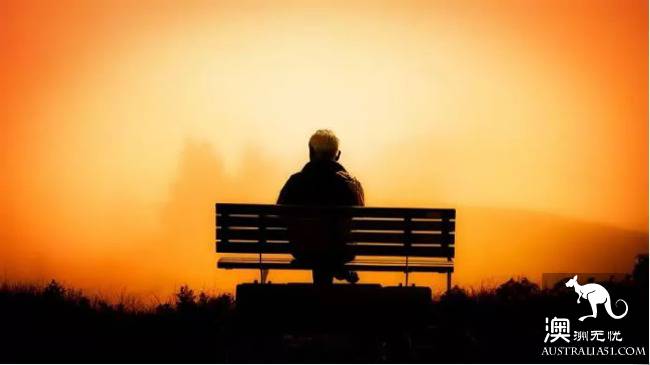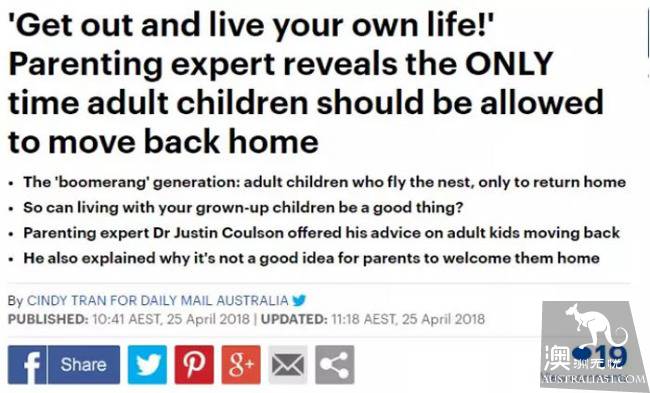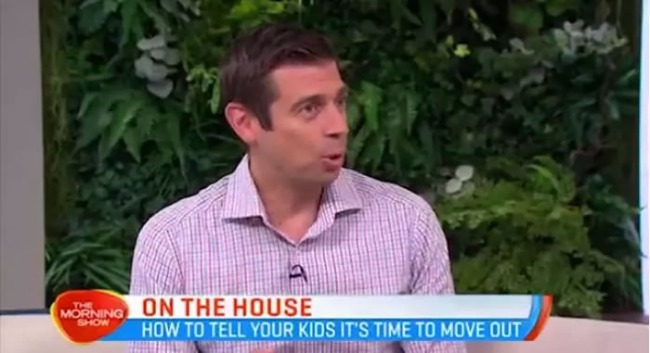The Chinese old people often like the atmosphere of the big family, they think the happiest thing is to live with their children when they are old, usually they go to work, they help bring their grandchildren at home, buy food to cook and do the housework. We live together, noisy, heart is not lonely.
The Australian elderly, on the contrary, like a lively parent-child atmosphere, but they want to have their own space. When the children are adults, they only want them to move out of the house to rent their own homes and have their own lives when they get a job, and when they have trouble or no way to go, the door will be open to them.

Recently, an Australian parent-child expert mentioned on the show that young people born in (boomerang generation) tend to go home and live with their parents, but in Australia, this is annoying for Australian parents. Not only do these parents not welcome their adult children home, but they even say without mercy, "get out of here and live your own life!"
This approach, experts say, is actually necessary.

(photo source: Daily Mail)
1, "I love my children, but will you leave us alone"?
Australian parent-child expert Justin Coulson (Justin Coulson) said during a morning talk show that according to the data survey, Children known as millennials (those born in 1984-2000) are fewer and less likely to move out because many of them choose to go to college or continue to live with their parents while looking for work.
With the emergence of this social phenomenon and conflicts between young people and parents, more and more Australian parents are aware of the disadvantages of doting on their children.
Coulson cited the findings of a study by the London School of Economics that showed that when children move home and live with their parents when they reach adulthood, their parents' well-being is declining.

"We used to emphasize the imposition of our consciousness on our children, which is not a victory for parents." He said, for example, that many children develop the habit of not doing housework at home, but when they reach adulthood, many Australian parents will no longer do housework for them, and this is usually the case at home: dishes that are not washed, A mess of children's rooms.
The children complained that their parents were no longer responsible for them, and that they were complaining that their children did not do the housework. Dr Coulson's advice was to let them out.

(photo source: Daily Mail)
2. Independence does not mean that children cannot go home and rely on their parents.
However, Dr. Coulson also stressed that parents can still open their homes to their children when they are in trouble. According to Dr. Coulson, "unpredictable conditions" include expensive house prices, unemployment or marital breakdown.
"as parents, we want our children to get the best results, and we want them to have a stable foundation," he said. In their lives, there will be some environment in which there is no doubt that more support is needed and less support is needed. "

(photo source: Daily Mail)
But Coulson also encourages parents who still allow their children to live with themselves, and if they insist on living with their parents, give them a little "contribution", such as paying modest "rent" and meals.
Coulson stressed that it was a "transition period" from adolescence to adulthood, from adulthood until the child moved out of the home, but the transition was getting longer and longer as more young people chose to live with their parents.
More and more Australian parents tend not to go home
In fact, there are a lot of Australian parents who don't want their children to move home in the commentary area of the news: "my 23-year-old son returned to us after three years of working and living a long way away from us. I can say that I love my son and will die for him, but I don't want him to come back and live with us just for the hard work of leaving us. My life has been quiet for the past three years, without his temper and daily quarrels. "
"I told my adult children that they could live at home until they were 25 or married, no matter where they went, but I think it's sad that people over the age of 30 and over have to live with their parents, unless they have to. Fly further, children! "
But some parents say they can go home if their children are in trouble:
"I asked my 24-year-old son to move home, so he could save some money and leave his crazy girlfriend."
It can be seen that many Australian parents, as stated in the article, do not want their children to live with them, but if the children are in trouble, the family will still be their haven. This social atmosphere of independence and mutual respect is also a feature of Australia.
In Australia, we don't usually see many native Australians who sacrifice their retirement time to do housework or help their children with children, because for them, retirement should be used to enjoy life. And children can only make their lives restless.